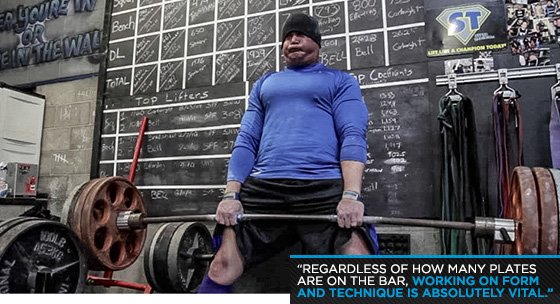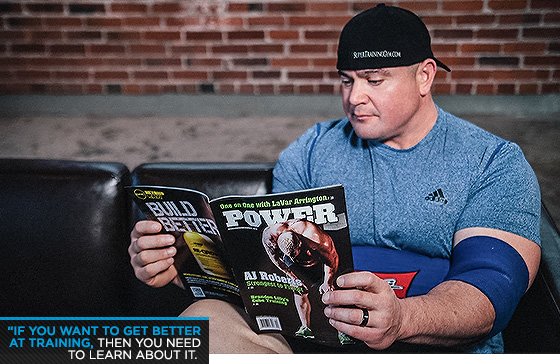Hey Strong Guy, I'm new to lifting. Where do I start?
Getting big is no small feat. Even when you're new to the gym, you don't have to feel lost. Asking for help and keeping it simple should equip you with the tools for success.
You're already motivated. You're asking questions and reading. Now it's time to act. Get your butt inside the gym and take charge of your training and body. If you want to improve, fear has no place.
Bell's Newbie Training Guide
Watch The Video - 16:20
Instead of grabbing a dumbbell and timidly looking around as you try a few curls, suck it up and take these four piece of advice:
1
Ask For Help
Do not be afraid to ask other people for help. Choosing somebody who's actually knowledgeable is not an easy task, especially when you're so unsure yourself. Try this: Walk into a gym at 5 p.m. on a Monday. Scan the gym for the biggest, most jacked dude, the guy who's moving around the most weight (and who doesn't look like an asshole). Go over to him and say, "Hey, excuse me, I want to know what's going on over here. I want to look like you." Tell him that you'll pay him for his time. Guys will usually just show you some stuff for free—especially if you're not arrogant and you're polite.
Quick tip: Don't start yapping right as he's about to handle 150-pound dumbbells. Catch him in between sets.
You can also use a personal trainer. Or, try a local CrossFit gym. I know some of you guys are going to bash me for saying that, but some CrossFit boxes have decent coaches and highly skilled athletes. If you want to get into Olympic lifting, they can give you some advice, and have a good setup for deadlifts, squats, cleans, and those types of things.
You can also hit a website like Powerliftingwatch to find a powerlifting gym. More than likely, if you find a powerlifting gym, you're going to run into some decent powerlifters. It's also a great idea to go to an actual powerlifting meet and start talking to people. Try to figure out who's the strongest guy there and then ask a lot of questions: What does he do? Where does he live? What does he eat? How can I get involved with or communicate with him to get stronger? There's no shame in asking for help!
2
Train Within Your Means
If you can't find a lifting-focused gym, a commercial gym works just fine. They provide a lot of equipment: Hammer Strength, Cybex, cable pieces, etc. There's nothing wrong with using that equipment—we've all started out on some of that stuff. That's how you get jacked in the first place, isn't it? You get jacked doing squats, deadlifts, and bench, but you also need some of that filler stuff to maximize results.
Work with sets of 10 on just about everything you can think of. Don't try to lift too heavy too soon. If you're trying to bench press and your arms start shaking and you can't keep the lift under control, reduce the weight. Your last rep should look similar to your first.

Be smart. If things are difficult for you, if anything hurts, don't do it. You're not ready for it. If you try to get on some sort of machine and it hurts you, don't use it.
Most important, there's nothing wrong with practicing. I did whole set of practice pulls and practice deadlifts the other day; I worked for an hour. I got a lot out of it. And you know what? I'm sore as shit. Regardless of how many plates are on the bar, working on form and technique is absolutely vital. You do not want to develop any bad habits. Train within your means.
3
Eat Simple and Clean
I'm going to make this simple: No more fruit juice, no more soda, no more sugary drinks. You're an athlete. You're trying to become a bad mother trucker, so get rid of all that junk. Stick to natural, slower-digesting carbohydrates: Any form of potato will do; white or brown rice is also fine. Avoid bread. Eat as many vegetables as you'd like.
Get one gram of protein per pound of bodyweight, and if you're fairly lean, one gram of carbohydrates per pound of bodyweight. If you're not lean, half a gram per pound of body weight is adequate. Make sure you eat healthy fats. Coconut oil and fish oil are crucial.
Supplement-wise, I'm a fan of Vitamin D-3. Since taking it, I've noticed that I don't get sick as often. Also make sure that you take a good multivitamin. Protein is OK, especially if you find a good form and it tastes good. But don't worry about pre- or post-workout supplements for now. Once you have a few notches in your weight belt, you can start being more serious about your supplementation.
4
Read!
If you want to get better at training, then you need to learn about it. Yes, asking for help is a great way to start, but it's also important that you put some expert knowledge in your mind. If a guy isn't familiar with Louie Simmons or Kelly Starrett, I assume he doesn't know shit.

Here's a list of sources for you to check out:
- The Cube Method, by Brandon Lilly
- 5/3/1, by Jim Wendler
- The Westside Book of Methods, by Louie Simmons
If you want to dive in a little deeper, this is a great source. - Carb Night and Carb Backloading, by John Kiefer
Available at Athlete.io - The Periodization Bible Part 1 and 2, by Dave Tate
If you want to try the conjugate system, this article is for you.
